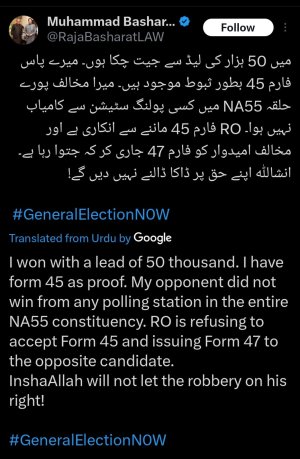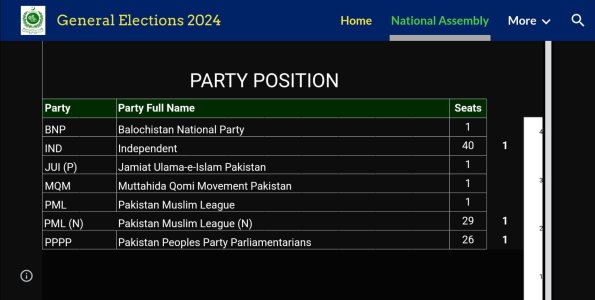What do you guys have to say about it? It all happened in the RO offices.
--------------------
Transparency at polling stations, not in RO offices: FAFEN
Free and Fair Election Network (FAFEN ) noted on Saturday that transparency in elections was observed at polling stations, but not in the offices of returning officers (ROs).
Addressing the media at the launch of the electoral watchdog’s preliminary report on the February 8 elections, FAFEN spokesperson Musarrat Qadeem said that delay in the release of poll results, and suspension of internet and mobile services damaged parliamentary efforts made through the Election Act.
The electoral observatory further noted, "The failure to display copies of Form 45, as required, in 29% of polling stations was a notable oversight."
These findings underscore challenges in the electoral process, urging thorough examination and improvement for future elections, the spokesperson noted.
FAFEN emphasised that, "The Election Commission must promptly address and resolve candidates' complaints, as timely resolution is crucial for maintaining electoral credibility."
"Despite these challenges, over 50 million voters participated in the February 8 elections," Musarrat said, observing that while that was a substantial turnout it remained at 48%.
The election, held after two years of continuous deliberation, drew attention to the commitment of political parties to the democratic process, the spokesperson stated, adding that, "Participation of parties in elections reflected their dedication to democracy.
Commending the ECP, she highlighted that, "Holding elections despite criticism demonstrates resilience." "This election was the country's largest endeavor," she observed.
Despite appointing 5,664 observers across the country, FAFEN highlighted certain issues. The spokesperson noted, "Presiding Officers did not provide Form 45 to observers at 28% of polling stations."
Access was denied at RO offices, hindering transparent observations, according to FAFEN.
FAFEN revealed, "The margin of rejected votes was higher than the winning margin in 25 constituencies." Despite challenges, the elections saw a record number of candidates participating, marking a remarkable turnout.
A day earlier,
Interior Minister Dr Gohar Ejaz while discussing security challenges faced by the interim government during the general elections stated on Friday that 56 incidents were reported on election day despite the suspension of mobile services.
Addressing a presser along with caretaker Information Minister Murtaza Solangi, Ejaz said "The decision to shutdown mobile services was made at a high-level security meeting".
He revealed that the "emergency decisions" were made due to the "martyrdom of 28 individuals" a day earlier to the elections. The mobile services were suspended because the terror attack was "not a suicide attack, but a device bomb attached to a motorcycle".
The minister highlighted the necessity of such measures for the protection of human lives, stating: "These actions were crucial for ensuring the safety of individuals." Furthermore, he reported that "there were 56 incidents on the day of the election, and there were intelligence reports of terrorist incidents taking place."
Eijaz said that "February 8 was a challenging day" as he referenced the
terrorist incidents of February 7 in which 26 people were martyred. In light of the Qilla Saifullah incident, he said, "We decided to close mobile signals" in a high-level meeting.
He acknowledged the difficulty of the decision, saying, "It was not an easy decision to close mobile signals", justifying it as one taken to "secure lives".
Cellular services suspension
Pakistan witnessed a
countrywide shutdown of internet and cellular phone services a day earlier during the polling process with the authorities attributing the move "to maintain law and order" in the wake of the violence that occurred a day earlier.
However, the suspension was denounced by Amnesty International, which described it as a “reckless attack on people’s rights”, as well as experts and political stakeholders, particularly the PTI, a political party that relied heavily on social media platforms for its electoral campaign.
"It has been decided to temporarily suspend mobile services across the country," an interior ministry spokesman said in a statement.
The spokesman added that “precious lives have been lost” in recent militant attacks in the country and "security measures are essential to maintain law and order situation and to deal with potential threats".
Spokesperson says delay in results caused uncertainty; mobile, internet shutdown impeded parliamentary efforts

tribune.com.pk














